Lawn aeration serves two parallel but seemingly contradictory purposes, but in every garden, lawns should be aerated at least once a year so if you’re in the market for a new lawn aerator, let us guide you through some of the best lawn aerators we’ve found this year.
In this guide, we’ll share our thoughts on the most efficient way to aerate a lawn, as well as the most cost effective and traditional lawn aeration techniques.
More...
Top Pick

Best Value

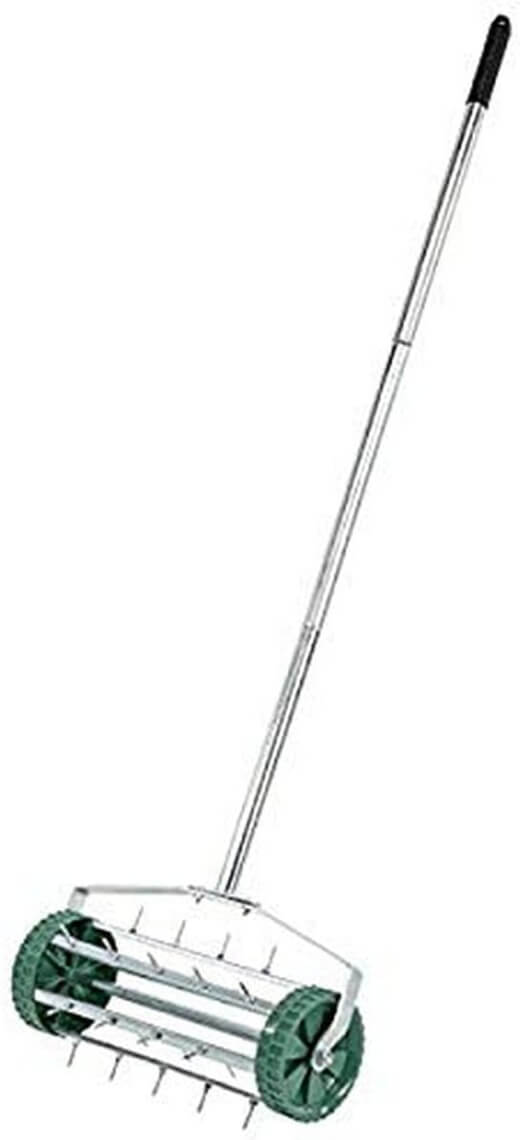
Best Lawn Aerators for 2025
What is Lawn Aeration?
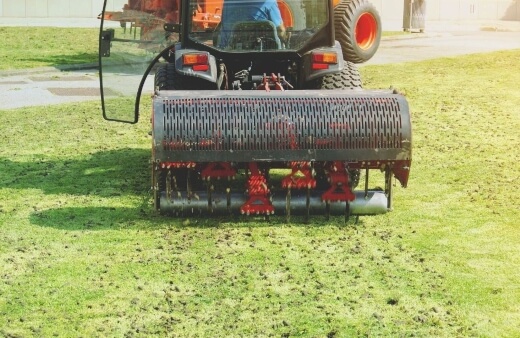
Aerating lawns is the process of piercing the soil surface covered by grass to allow water in and out of the root systems. Lawns require regular aeration to prevent waterlogged lawns, or overheated lawns.
By piercing the top layer of thatch and roots, you’re allowing water further into the roots, promoting healthy, stronger lawns for playing surfaces.
For lawns near ponds, bogs, or wetland, helping water drain away from the surface to maintain a more even surface that will be less prone to slippages, slump and puddles.
There are a few different ways to aerate lawns, either by taking plugs out of dry patches to allow the soil to de-compact (even a simple bulb planter will do this job, and over the course of a year, the plug of soil you remove will be filled with new roots, pushing compacted soil into the new space.
This promotes much healthier root environments when you have dry patches on your lawn, without needing to re-seed or re-turf and can save a lot of money.
The other option, and the most common, uses elements of the above by creating more smaller holes, and was traditionally done with a garden fork.
By jamming the fork into your lawn surface, all over the garden, you create cavities for water to drain, or evaporate around the roots. The space also gives old roots space to branch out, giving you greener lawns within 4-6 weeks.
Lawn Aerator Buying Guide
Why Use a Lawn Aerator
Literally every gardener needs a lawn aerator. Traditional methods of walking up and down the lawn for hours, jamming a garden fork into the ground take time, effort and don’t aerate evenly.
It is only really beneficial to waterlogged lawns as it usually goes too deep to provide the shallower holes needed for overheating lawns. The type of lawn aerator you need depends entirely on the types of lawn you have too.
How to Use a lawn Aerator
It’s hard to give a definitive guide on how to use a lawn aerator, as there are so many different ways of doing it. There’s something really quite fun about spiked shoes, but mechanical aerators usually require mains power, and a steady path.
I’ll try to explain each type in more detail below:
Different Types of Lawn Aerators
Lawn Corer
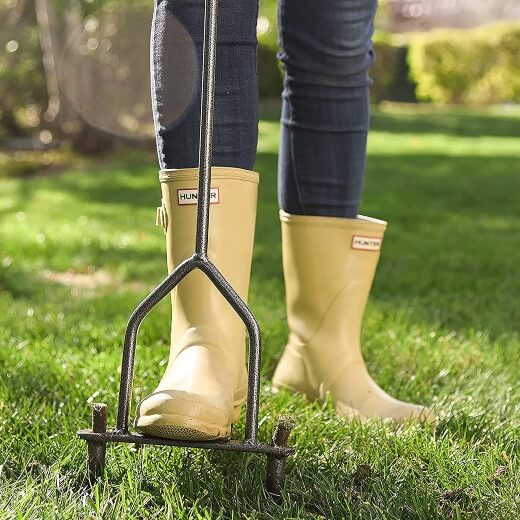
Plug aerators, or lawn corers are the most effective, but also most time-consuming lawn aerators. Lawn cores do exactly what their name promises, by removing a core of lawn, usually less than an inch across, to allow better air, moisture, and root movement.


Get Your Free Guide:
Master Growing Australian Natives eBook
A Must Have Complete Guide for Every Australian Garden
Get Your Free Guide:
Master Growing Australian Natives eBook
A Must Have Complete Guide for Every Australian Garden
The best lawn corers have multiple spikes, but you can get budget corers with just one or two lawn corer spikes. Because they need to be used perfectly vertically to work, there are no electric or mechanical lawn corers that will do the job neatly.
This is a job that needs to be done by hand, and is best advised when just a small area of lawn needs improvement. By targeting your efforts on one either dry, or boggy patch of lawn, you’ll have the job done in no time.
Spike Aerators
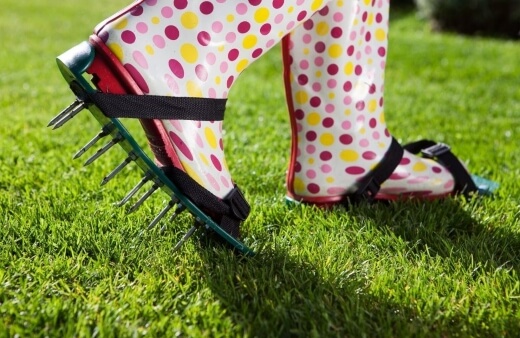
Spike Aerators cover quite a few options; manual, rolling and electric, but simply put, rather than removing cores of soil, they pierce the ground. I’ve been using spike aeration on our lawns for years, and in the wildflower patch it's really useful to help drainage over winter.
When the annual flowers have all died back and dropped their seed, we scythe them, then spike aerate the lawn with a lawn roller.
This stops puddles on what is quite a heavy clay lawn, meaning we can continue to grow verdant grasses speckled with bright flowers every year on the worst possible soil.
Rolling Lawn Aerator
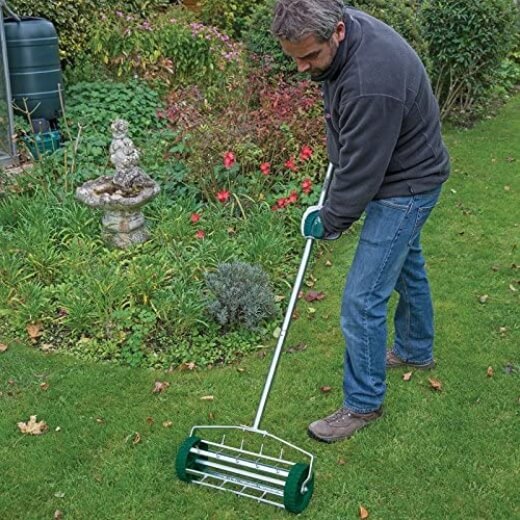
I’ve already mentioned rolling lawn aerators, but they are slightly different to manual spike aerators. While a manual spike lawn aerator needs to be pushed in by foot on every insertion, the rolling models just need pushing.
Because of the circular motions they tend not to pierce lawns as deeply, so are great for dryer lawns, but not as effective on wet lawns, where spike depth is important to help with drainage.
Some spike aerators have individual needles, but often the most effective (certainly if you plan to reseed your lawn in spring) are the serrated kind.
Serrated lawn aerators create straight lines of cut grooves in the soil, and while they don’t do much to improve drainage, they are great for creating a base for new seeds, and by cutting through grass roots promote healthier roots, and more vigorous grass in the following year.
Lawn Scarifier
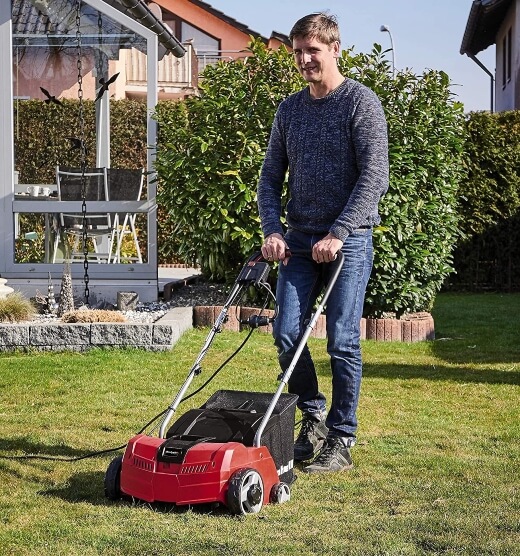
Scarifiers are technically not aerators, but when mosses build up on a lawn they can be incredibly damaging to the grass, and hold water on the surface. This makes your lawns wet to touch and walk on, while also starving the grass itself of water.
Scarifiers are more expensive than lawn aerators though, so before you go out and buy one, try scraping a leaf rake through your lawn a few times, with heavy pressure applied.
If it brings up a generous thatch of moss, you can either continue with this for the next few days, or invest in a lawn scarifier, which will do the job faster and better.
The best lawn scarifiers are also dual use, and come with serrated aerators too, which helps your grass to recover after the scarification process, which is aggressive and will leave your lawn looking bare for at least a month after scarification.
Tow Aerators
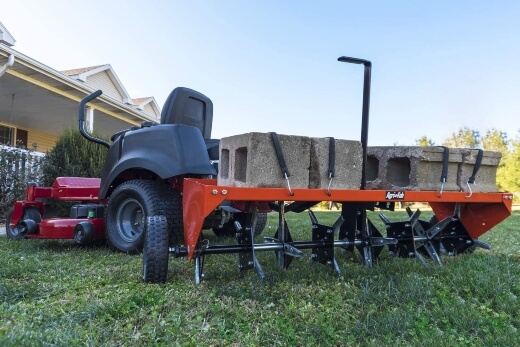
Tow aerators cover all of the above, but for larger areas of grass are much more efficient. They attach to ride on mowers too, so you can simply pull them behind you while using a zero turn lawn mower to do two jobs at once.
Sounds convenient? Check out our review on the best zero turn mowers for 2025.
Doing it this way is not just efficient, it’s actually better for the lawn, as by cutting the grass first, you’re promoting top growth, which will accompany the new root growth encouraged by your lawn corer or lawn aerator.
Lawn Aerator Reviews
1. Spear & Jackson Lawn Aerator
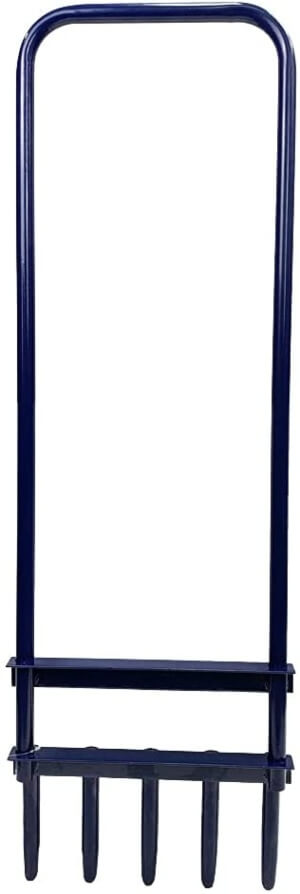
This 5 pronged lawn aerator is from a trusted brand, and while it’s manually operated, still makes the job of lawn coring fast and efficient.
It works by plunging a set of five lawn corers into the soil at once, automatically pushing the previous cores out when you push it into the next hole.
Unlike lawn spikes, this aids watering, without increasing soil compaction by removing soil rather than pushing it down.
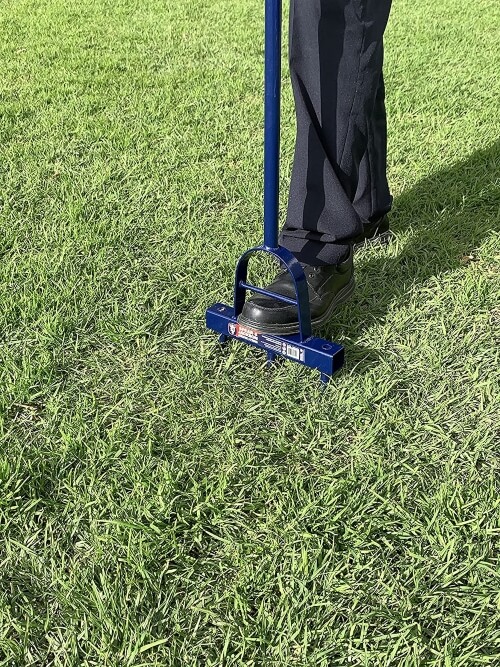
Pros
Cons
2. Draper 83983 Rolling Lawn Aerator

Draper’s rolling lawn aerator is fast, efficient, and easy to use, and for medium-large lawns a great option for domestic gardeners who don’t want huge tools taking up their entire garage.
Because it’s a spike aerator, it won’t tear up your lawn either, unlike rolling lawn corers, which can catch on wet soil and tear out chunks of soil and root.
For the average lawn this is a perfect tool for general maintenance, ensuring better drainage, aeration, and giving roots space to grow. The only downside, is that like all spike aerators it compacts soil rather than removes it.
But the Draper model is significantly less compact than manual stand on types.
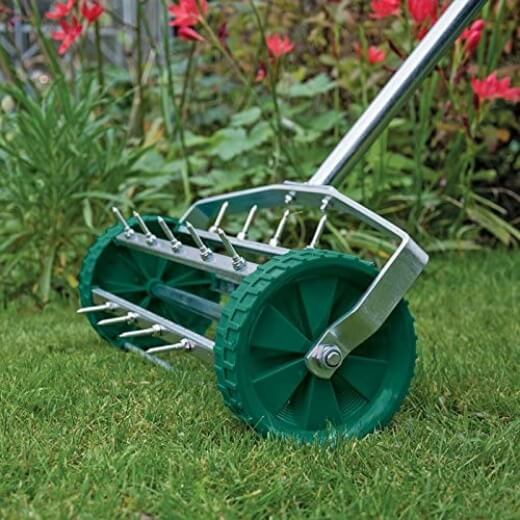
Pros
Cons
3. ProPlugger 5-in-1 Lawn Tool and Garden Tool
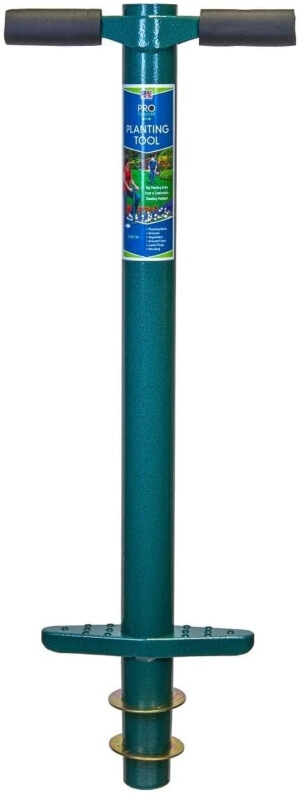
The ProPlugger is technically a bulb planter, but for serious waterlogging or severely compacted soil it does the job better than multi spiked lawn corers.
It’s got a big diameter, so certainly isn’t one to use over the entire lawn, unless you really want your grass to look like it’s been invaded by moles.
(it's unlikely because they’re desert creatures, but if your lawn has been invaded by moles it’s pretty important you let them be – they’re endangered in Australia and need all the help they can get)
For lawns that need extra care in select spots the ProPlugger is the perfect tool, just use it sparingly.
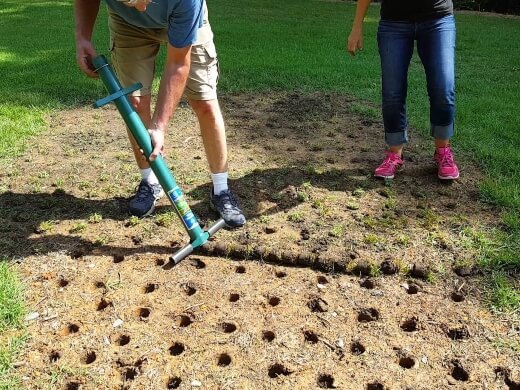
Pros
Cons
4. Walensee Lawn Coring Aerator

The choice between this and the Spear and Jackson model is really about speed, or durability. They are almost identically priced, but the Walensee lawn corer is built from reinforced steel, with welded joints and a stronger footplate than almost any other lawn corer.
This makes it heavier, but much better for tougher ground, although to cover the same area you’ll be taking twice as long.
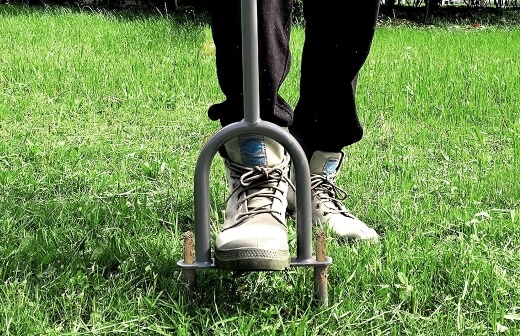
Pros
Cons
5. Agri-Fab 45-0299 48-Inch Tow Plug Aerator
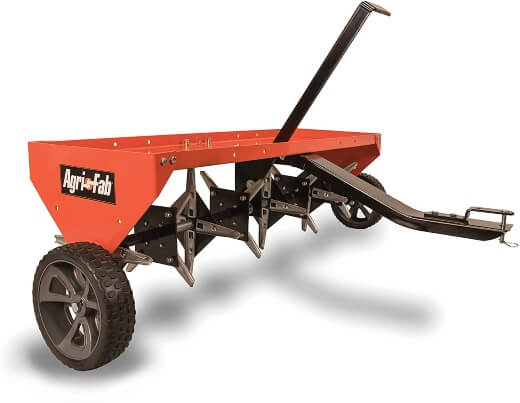
If you have a lawn big enough to need a ride on mower, you’ll need an attachment to help you aerate it every year. For large lawns, aeration can take days to complete, rather than a few hours with hand tools on smaller lawns.
Attachments like the Agri-Fab plug aerator take all the effort out of aeration, but because they have rotary systems can risk damaging lawns as result.
Personally, I prefer lawn spikes for tow aerators, but for serous drainage, or compaction, removing plugs is the only option.
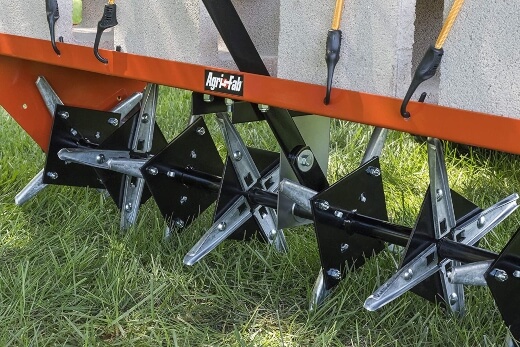
Pros
Cons
6. Plantnomics Lawn Aerator Shoes
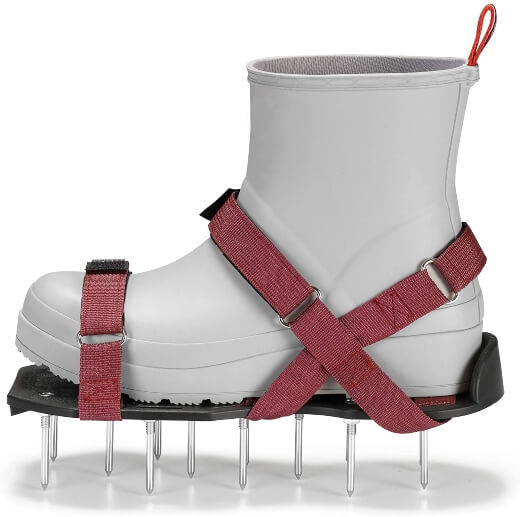
There are so many lawn aerator shows on the market, but 90% of them are completely useless. They break after a few uses and barely do anything for compacted lawns.
Plantnomics are a much more durable lawn shoe, but come with the price tag to match. As well as being a really efficient way to aerate lawns, they’re great for aerating compacted dry lawns on looser soils.
The spikes help water reach the roots, but also slightly compact the soil as you walk to reduce the risk of water loss.
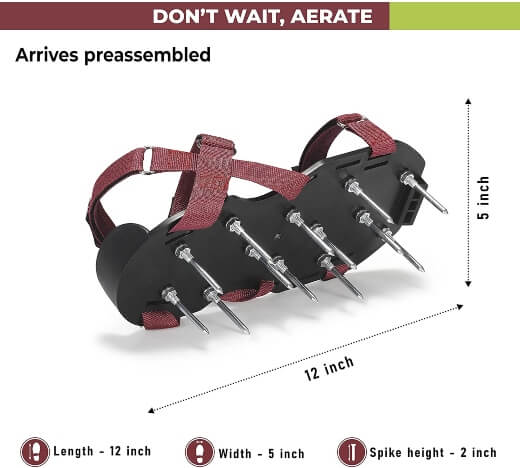
Pros
Cons
Best Lawn Aerators Australia
I don’t think I could have chosen three more different products for our best buys, take a look:
Aussie Green Thumb Top Pick


The Spear & Jackson Lawn Aerator is our top pick simply because it’s a great, durable lawn aerator that works quickly and efficiently for most average size gardens.
Ok, so you have to do all the work yourself, and pick up lawn cores as you go, but it’s the most effective tool to get the best from your lawn. It takes small plugs, and pushes them out each time you plunge them into a new hole.
By removing small plugs of soil from your lawn you create much better drainage and reduce soil compaction significantly. You’ll have a noticeable impact within 1-2 weeks.
Best Value Lawn Aerator


The Draper 83983 Rolling Lawn Aerator is the classic, made by a great brand, so you can trust it works. It’s made on budget so it's got a budget price, but properly cared for it will last a lifetime.
If you have a serious problem lawn though, investing in something more serious and taking the time to properly remove plugs is an important step. But this is the right tool to maintain an already healthy lawn.
Lawn Aerator Frequently Asked Questions
How do lawn aerators work?
Lawn aerators are tools used to lower soil compaction, and create channels for air and water to reach grass roots. Without proper aeration grass is deprived of nutrients and moisture, and can quickly succumb to high summer temperatures.
What’s the best way to aerate your lawn?
Lawn coring is the most effective way to aerate your lawn. Lawn coring removes plugs of soil and grass from your garden, which allows air flow, and water penetration to help reinvigorate root health, and trigger more prolific lawns.
Should I aerate or dethatch first?
If you’re not sure whether to aerate or dethatch, the answer is usually: both. Start by dethatching your lawn to remove the worst of the moss and surface weeds fighting with your lawns, then leave it for two weeks before aerating so your lawn has a chance to recover between these invasive treatments.
How often should I aerate my lawn?
Aerate your lawn at least once a year in spring when the days begin to lengthen, just after your first cut of the year. Once lawns begin to grow, they are telling you that they are ready to grow new roots, and repair themselves.
In particularly hot weather, it’s a good idea to aerate in mid-summer too.
For more gardening tools to help you take care of your lawn, refer to our round up of product reviews below:

There is a Lawn Aerator for Every Type of Garden
The only wrong time to scarify or aerate your lawn is winter, so get going now and don’t leave it too late. While the temperatures are warmer and the weather is dry, make the most of the sunshine and spend a day getting to grips with the requirements of your lawn.
I’ll admit that I neglect our lawns here every so often. Most gardeners forget about them in favour of more exciting flowering shrubs, but lawns are the centre of our gardens, so keeping them looking good should always be a priority.
Our list of the best lawn aerators and lawn corers above should at the very least get you on your way to finding the right tool for your lawn.
Published on January 14, 2022 by Gary Clarke
Last Updated on December 27, 2025






